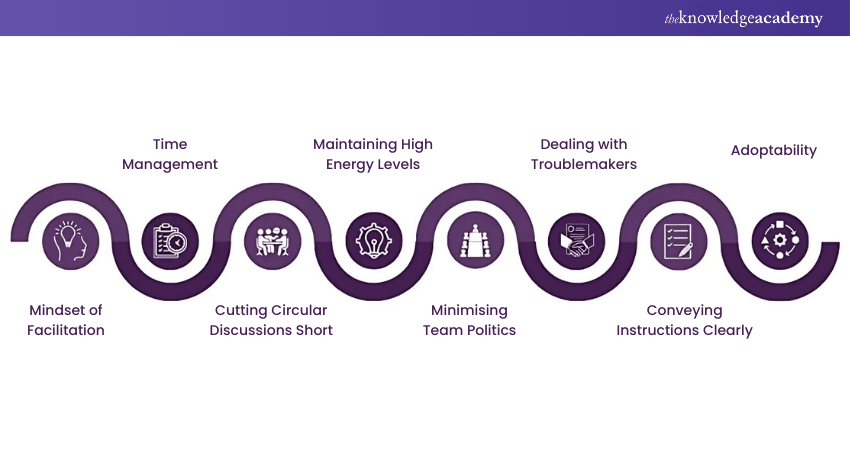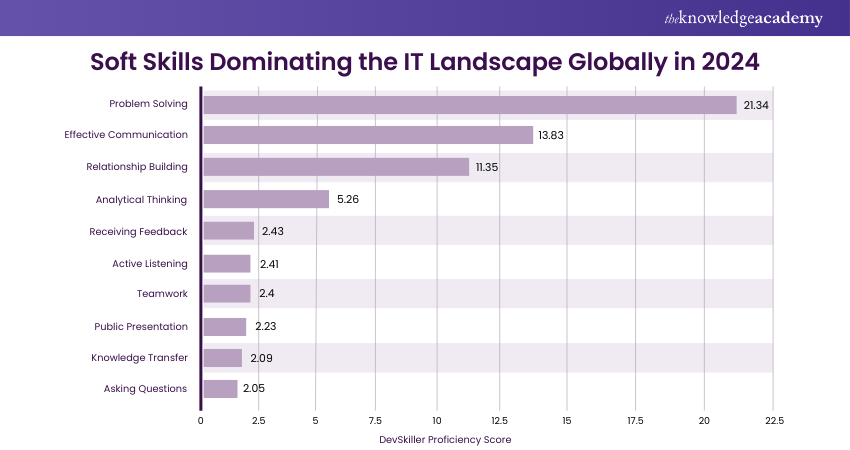We may not have the course you’re looking for. If you enquire or give us a call on 01344203999 and speak to our training experts, we may still be able to help with your training requirements.
We ensure quality, budget-alignment, and timely delivery by our expert instructors.

Picture this scenario: you are in a meeting where ideas are scattered, and nothing seems to move forward. Does it sound frustrating? Now imagine the same meeting with a skilled facilitator guiding the discussion, and ensuring everyone gets a chance to contribute. That’s the power of Facilitation Skills. But What are Facilitation Skills? These help you create productive conversations, encourage collaboration, and drive better decision-making.
So, how do you develop these skills, and what makes a facilitator truly effective? In this blog, we’ll explore everything about What are Facilitation Skills, Ready to transform the way you lead discussions? Let’s dive in!
Table of Contents
1) What are Facilitation Skills?
2) Why are Facilitation Skills Important?
3) Looking at the Various Facilitation Skills
a) Time Management
b) Maintaining High Energy Levels
c) Active Listening Skills
d) Conflict Resolution
e) Communication
f) Adaptability
g) Self-awareness
4) Conclusion
What are Facilitation Skills?
Facilitation Skills blend competencies and soft skills to design and guide group processes effectively. These skills shine when planning and leading collaborative efforts like workshops. For more on workshops, check out our guide. Facilitation often involves using activities, tools, and methods in workshops.
Seasoned facilitators build a toolkit of proven processes and templates. Behind-the-scenes (BTS), facilitation includes preparing and designing meetings, events, and activities, shaping agendas to help groups achieve their goals. Various software tools assist facilitators in delivering great sessions, and Facilitation books are invaluable for exploring new techniques and tools that can enhance a facilitator's toolkit.
Why are Facilitation Skills Important?
Strong Facilitation Skills help teams communicate, collaborate, and achieve better results. Whether you're leading a meeting, running a workshop, or managing a project, knowing how to guide discussions and keep things on track makes all the difference. Here’s why these skills matter:
a) Improves Communication: Helps people express ideas clearly and listen actively.
b) Encourages Collaboration: Creates an open space where everyone’s input is valued.
c) Boosts Problem-solving: Guides teams in brainstorming and finding creative solutions.
d) Keeps Meetings Productive: Ensures discussions stay focused and time is used effectively.
e) Strengthens Teamwork: Builds trust and engagement, making teams work better together.
f) Manages Conflict Smoothly: Helps navigate disagreements and find common ground.
g) Increases Efficiency: Speeds up decision-making and keeps projects moving forward.
h) Develops Leadership Skills: Enhances your ability to motivate and manage teams effectively.
Enhance Your Facilitation Skills! Check out our expert Group Discussion Tips to lead productive and engaging conversations in any setting."
Looking at the Various Facilitation Skills
Here is a descriptive list of the various Facilitation Skills that make a good Facilitator:

Time Management
One of the essential Facilitation Skills is the ability to manage circular discussions, those conversations that loop back on themselves without any progress towards resolution. These discussions can consume a lot of time and energy and hinder the group's ability to achieve its objectives.
Moreover, Facilitators must be able to identify when a discussion is becoming circular and have the tact and strategy to guide it back on track. This could involve summarising the key points made so far, refocusing the group on the original objective, or proposing a break for participants to reflect.
Sometimes, it might also mean redirecting the conversation to a different but related topic to gain new perspectives. These actions require a keen understanding of group dynamics and strong communication skills.
Motivate your team and improve performance by signing up for the Successful People Management and Team Leadership Course now!
Maintaining High Energy Levels
Another one of the many Facilitation Skills that every facilitator must possess is the ability to maintain high energy levels. They must ensure that the team stays energised in terms of engagement, creativity and productivity. These three aspects must be maintained through the group meetings or activities that they take part in.
Additionally, the skill particularly involves a good perception of the group’s energy dynamic. A good perception entails a knack for recognising when the energy levels wane, followed by the ability to reinvigorate the participants.
Further techniques might include introducing engaging activities, varying the pace of the session, encouraging participation through questions, or even using humour to lighten the mood.
More importantly, one facet of such a Facilitator is to understand the various personalities involved and how to connect with them. Now, effective Facilitators create a positive and lively environment that fosters active collaboration, making the process enjoyable and the goals achievable.
Active Listening Skills
For any conversation to be effective, participants must feel truly heard. Active listening is one of the most valuable group facilitation skills and serves as the foundation for productive discussions. The role of facilitation requires you to build your active listening techniques and support group members in developing their own listening skills.

Paraphrasing with point references along with summarisation functions as strong indicators that the group members' contributions receive recognition. Additionally, active listening involves using positive reinforcement to engage quieter participants and draw them into the discussion.
If you're looking to enhance just one facilitation skill, mastering active listening is an excellent starting point for fostering meaningful and collaborative dialogue.
Register for our Industry Training and stay ahead of the curve and thrive in your industry!
Conflict Resolution
A facilitator acts as a neutral guide, ensuring all sides of an argument are treated fairly while steering the group toward compromise or mutual understanding. This neutrality becomes even more critical in complex disagreements involving multiple perspectives.
Professional facilitators use their insight to anticipate conflicts before they arise, allowing them to implement proactive measures for prevention. Addressing challenges is just one aspect of the role, as the ultimate objective is to foster an environment for positive dialogue among all parties. To assess a facilitator's ability to handle such situations effectively, exploring key Facilitator Interview Questions can be invaluable.
Communication
A superior facilitator goes beyond passive hearing because they express their thoughts with defined precision. Listening and interpretation forms a base of success yet expressing your thoughts with clear understanding represents equal importance in the facilitation process.
The key? The facilitator speaks in a way that everyone comprehends but prevents himself from controlling the discussion. A facilitator maintains their communication as short yet powerful whether they speak or take notes. Their main duty involves bringing forward the perspectives of others instead of pushing themselves forward as the main focus.
Through their apt communication skills facilitators give all participants a feeling of being heard while sustaining the concentrated and effective dialogue flow.
Optimise operations, cut costs, and lead with confidence – join our Facilities Management Training.
Adaptability
Another key attribute of a seasoned facilitator is adaptability, which is utilised in combination with other Facilitation Skills that allow a facilitator to respond in an effective manner to unexpected changes or challenges. Now, a group’s dynamic can face rapid shifts, calling for the facilitator to readjust the group’s content and pace on the go.
Additionally, skills such as active listening, empathy, and quick problem-solving come into play because a Facilitator must be alert to subtle cues, able to read the room, and ready to employ various techniques to keep the group on track towards its objectives.
More importantly, a Facilitator who embodies these qualities can navigate complex and evolving situations with grace and efficiency, ensuring that the group's goals are met despite any unexpected challenges.
Self-awareness
Excellent facilitation goes beyond discussion direction since great facilitators maintain complete awareness of both group dialogue progress and their own impact within the process. The lack of self-awareness within a facilitator can lead to unanticipated support for one side which destroys the team’s advancement process.
Neutrality and unbiased facilitation maintain their best form because of self-awareness which ensures all participants can be heard. Self-awareness lets you both use your skills and understand your weaknesses to improve your guidance of the group in an effective manner.
Conclusion
Great facilitators don’t just lead conversations; they inspire engagement, collaboration, and real results. Now that you know What are Facilitation Skills, it’s time to refine them and create meaningful interactions. Be it for guiding a team or steering a complex discussion, strong facilitation makes all the difference.
Build systems that last – sign up for our Reliability Engineering Training today and enhance performance!
Frequently Asked Questions
What are the Three Basic Principles of Facilitation?

Facilitation is guided by three core principles: neutrality, inclusivity, and adaptability. Neutrality ensures the facilitator remains unbiased, inclusivity encourages active participation from all members, and adaptability allows adjustments to meet the group’s evolving needs and dynamics.
How to Facilitate a Group Session?

To facilitate a group session: start with clear goals and an agenda, create a welcoming environment, and establish ground rules. Use active listening to guide discussions, manage time effectively, and ensure all voices are heard. Stay neutral, encourage collaboration, and summarise key points to drive decisions forward.
What are the Other Resources and Offers Provided by The Knowledge Academy?

The Knowledge Academy takes global learning to new heights, offering over 3,000 online courses across 490+ locations in 190+ countries. This expansive reach ensures accessibility and convenience for learners worldwide.
Alongside our diverse Online Course Catalogue, encompassing 19 major categories, we go the extra mile by providing a plethora of free educational Online Resources like News updates, Blogs, videos, webinars, and interview questions. Tailoring learning experiences further, professionals can maximise value with customisable Course Bundles of TKA.
What is The Knowledge Pass, and How Does it Work?

The Knowledge Academy’s Knowledge Pass, a prepaid voucher, adds another layer of flexibility, allowing course bookings over a 12-month period. Join us on a journey where education knows no bounds.
What are the Related Courses and Blogs Provided by The Knowledge Academy?

The Knowledge Academy offers various Industry Trainings, including Facilitation Skills Training Course, Basic Barista Course, and the Product Management Training. These courses cater to different skill levels, providing comprehensive insights into Methods of Demand Forecasting.
Our Business Skills Blogs cover a range of topics related to Facilitation Skills, offering valuable resources, best practices, and industry insights. Whether you are a beginner or looking to advance your Business Management skills, The Knowledge Academy's diverse courses and informative blogs have got you covered.
Upcoming Business Skills Resources Batches & Dates
Date
 Facilitation Skills Training
Facilitation Skills Training
Fri 23rd May 2025
Fri 27th Jun 2025
Fri 8th Aug 2025
Fri 17th Oct 2025






 Top Rated Course
Top Rated Course



 If you wish to make any changes to your course, please
If you wish to make any changes to your course, please


